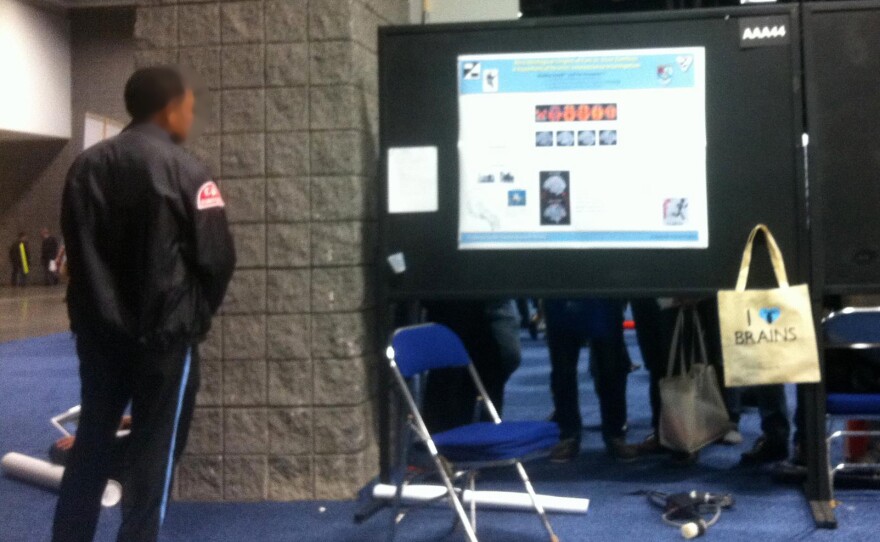Bradley Voytek's Zombie List
Must-See Zombies:
"Night of the Living Dead" (ground zero)
"28 Days Later" (very sophisticated social commentary)
"Shaun of the Dead" (most approachable zombie film, perfect introduction for the zombie novice)
"Return of the Living Dead" (tongue in cheek, horror, first introduction of zombies craving brains)
"Zombi 2" (over the top, includes the infamous zombie versus shark)
Extending the Genre:
"The Walking Dead" (comic and TV show)
"The Last of Us" (video game)
There's no escaping zombies. They've infected every corner of pop culture and more recently have been shambling into academia. Professor Bradley Voytek combines the living dead and neuroscience in the new book, "Do Zombies Dream of Undead Sheep?"
Bradley Voytek is the new Assistant Professor of Computational Cognitive Science and Neuroscience, and one of the world's zombie brain experts. He's also a member of the Zombie Research Society, an organization devoted to applying real neuroscience to the zombie brain. He now brings the zombie invasion to the campus of UC San Diego. So in addition to having his research published in "Scientific American," he’s also created a guide to surviving the zombie apocalypse. The guide provides helpful tips for dealing with the undead all derived from real neuroscience.
Voytek, along with fellow neuroscientist Timothy Verstynen, define the zombie condition as Consciousness Deficit Hypoactivity Disorder. CDHD, which is characterized by “the loss of rational, voluntary, and conscious behavior replaced by delusional/impulsive aggression, stimulus-driven attention, the inability to coordinate motor-linguistic behaviors and an insatiable appetite for human flesh.”
Voytek admits that there is a certain amount of tongue-in-cheek humor to all this but it does serve a real purpose.
“I’m a big fan of demystifying science,” Voytek said, “I try to figure out new ways of explaining complicated stuff and the zombie hook seems to have really caught on and caught people’s attention. I like to say I’m accidentally getting people to learn stuff. I can come in and talk about zombie brains under the guise of a fun talk but by the time they walk away they have actually learned something."
Voytek became interested in neuroscience when his step-grandfather was diagnosed with Parkinson’s Disease. Voytek recalled, “He went from being this really brilliant engineer I could talk science with to being relatively incomprehensible. His Parkinson’s was one of the first things that got me interested in the idea of neurosciences. I became interested in what was going on in his brain. It’s amazing the more and more I learn about the brain you start to realize just how tenuous all of this is and that’s kind of scary.”

In the book, "Do Zombies Dream of Undead Sheep?" Voytek and Verstynen serve up an introduction to neuroscience but through the guise of zombies. Each chapter tackles a different zombie behavior and breaks it down through the current neuroscientific understanding of it. It's a kind of Neuroscience 101 that tackles complex ideas in a fun, enjoyable manner.
Here is an excerpt from the book, which you can also listen to:
There are three major symptoms that we see in modern zombies that make us think that these deep brain systems regulating sleep are dysfunctional. First, zombies never really appear to sleep. They can wander around day and night looking for prey, without rest. This extreme form of insomnia suggests that the reticular activating system is chronically engaged and may never shut off. This is similar to what you see in animals with lesions (localized tissue damage) to the sleep- promoting VLPO neurons.
Second, while they are awake enough to move around and act, zombies appear to lack definite forms of awareness that are the hallmark of being completely awake. Instead they appear to move with the stupor and slowness that we all experience in those liminal moments between being asleep and being awake. Thus, there appears to still be some engagement of the sleep promoting neurons in the deep brain. This at first seems counterintuitive, given the first symptom of insomnia . . . but remember, the switch between awake (“on”) and asleep (“off ”) normally happens in fast cascades. If the cascades don’t happen in such a fast “flip- flop” fashion then you get sleep disorders like somnambulism.
Third, zombies appear to have horribly deficient spatial and experiential memories such as are encoded by the hippocampus. They get lost fairly easily, even in indoor malls where they’ve been stuck for weeks. We know that the creation of this form of memory is a sleep- dependent process. This further supports the hypothesis that zombies do not have well- formed sleep cycles. Now does that mean that zombies do not dream? Not necessarily. Severely sleep- deprived individuals will eventually exhibit rapid bouts of REM- like neural activity, even when awake. It is as if the part of the brain is briefly experiencing REM sleep while the rest of the brain is awake. So, it is still possible that zombies may dream, even though they never really appear to sleep.

“I study how do different parts of the frontal lobes -- very important in higher cognitive functions and goal planning, things like that -- communicate with other parts of the brain to give rise to all these amazing things that we can do.”
Voytek will be presenting his zombies and neuroscience lecture at Horrible Imaginings Film Festival this Friday at The Digital Gym Cinema. The event will probably sell out but Voytek will also be holding a book signing at the event that is open to the public. You can also look for an Evening Edition feature on Voytek next week,








